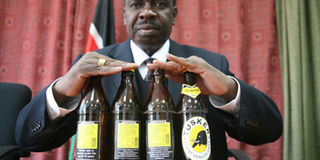Lawyers query Mututho orders on house parties

Nacada boss John Mututho displays beer bottles with health warning messages on July 19,2010. Lawyers have raised questioned about the Mututho orders on house parties. PHOTO | FILE
What you need to know:
- In a telephone interview with the Sunday Nation, the Nacada boss maintained that this was not a new directive, adding that it was published as a legal notice with regulations for the Alcoholic Drinks Control Act, 2010 by the late Prof George Saitoti three years ago when he was Internal Security minister.
- The directive has, however, not gone down well with Kenyans who had hoped to enjoy a drink or two during the festive season. Many say it is an affront on their civil liberties.
The party is over — or at least that is what he would want us to believe.
The National Authority for the Campaign Against Alcohol and Drug Abuse (Nacada) has a new boss.
And it is none other than Mr John Mututho, the no-nonsense responsible drinking crusader. If he has his way, this will go down as one of the dullest Christmas Kenyans will ever celebrate assuming he does not step up his efforts in the ensuing years.
The former Naivasha MP, who engineered the so-called Mututho Law during the 10th Parliament, wants Kenyans to pay between Sh500 and Sh1,000 for permits to hold house parties involving alcohol consumption.
Still, such party would have to end by 11 pm with those flouting risking arrest and a fine of between Sh30,000 and Sh100,000.
Lawyers think Mututho’s latest move is not feasible. Mr Gitau Mwara, a Nairobi lawyer, said the Alcoholic Drinks Control Act 2010 ought to focus on businesses and not personal lives.
“The Act was never meant to be applicable to private houses; this makes the move illegal and unconstitutional,” he said.
The lawyer says a legal notice cannot be enforced if it interferes with the right to privacy and personal liberty.
Bungoma Governor Ken Lusaka dismissed Mr Mututho’s directive. Speaking in Bungoma on Friday, Mr Lusaka asked Kenyans to enjoy their Christmas parties saying Mr Mututho’s directive was illegal.
He said Nacada’s liquor licensing was a devolved function and urged Mr Mututho to respect the law by allowing county governments to put in place laws that will regulate liquor in their areas of jurisdiction. He said only the county government has the duty to regulate and collect revenue from liquor licensing.
Mr Ken Kariuki, the Managing Trustee of the Responsible Alcohol Drinks Companies Association, which promotes good drinking habits, also says the organisation would prefer to engage the relevant authorities to look at the most optimal way to engage, educate and enlighten all parties on the key issues and getting a win-win situation.
Mr Kariuki says: “For the longest time, this law has not been enforced and we therefore need to look at the best ways.”
But Mr Mututho is not backing down, saying the law is behind him. He argues that Kenyans consume up to 75 per cent of all the alcohol in East Africa. “Even if you will be sitting under a tree in your home village, that licence will be mandatory and you therefore must notify the police,” Mr Mututho said. Police went into a slumber and Kenyans went on a party and spoilt it for themselves, so do not blame Mututho.”
In a telephone interview with the Sunday Nation, the Nacada boss maintained that this was not a new directive, adding that it was published as a legal notice with regulations for the Alcoholic Drinks Control Act, 2010 by the late Prof George Saitoti three years ago when he was Internal Security minister.
“All Mututho wants is compliance ... Mututho has not made new rules,” he said. “What I’m talking about is legal notice No 206 of December 17, 2010.”
The Nacada boss is referring to the 16th part of the Third Schedule of the Act, which lists types of licences and the fees charged for them, where a “temporary or occasional drink licence” is provided for at a cost of Sh1,000.
The directive has, however, not gone down well with Kenyans who had hoped to enjoy a drink or two during the festive season. Many say it is an affront on their civil liberties.
Ms Liz Scott, a resident of Eldoret, asks why “Mr Mututho thinks he has the right to burst into our homes and private spaces, to catch us and our families and friends drinking alcohol without a licence”.
“How he is going to implement this law? I have no idea,” she says.
Ms Scott also wants to know how many personnel would be involved in invading people’s private homes and in rummaging through their cars looking for water bottles containing alcohol.
“If we are caught carrying alcohol in our cars, we are in trouble; it doesn’t matter that we are simply transporting it from the shop to our homes for our own private use,” she said.
Mr Lucas Thuo from Kiamu, while supporting the fight against alcohol abuse, terms Mr Mututho’s directive ill-conceived and laughable.






